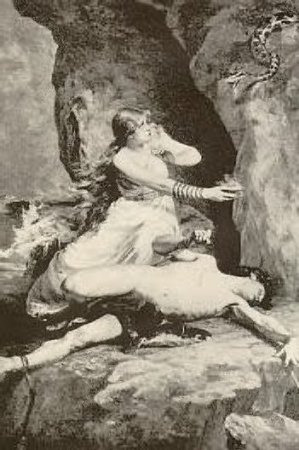Loki and BaldrWritten by Lokadottir, © 2001
I've come to the conclusion that the connexion of Loki with the death of Baldr has become so embedded in the contemporary psyche that it's going to be next to impossible to dislodge, so one might as well make of it what one can. Rather than being oppositional, I consider these positions complementary approaches and actively subscribe to both, because the former deals primarily with evidence, while the latter is largely interpretive in nature, and deals with the modern rather than the historical imagination.
It might be a different matter if all passages in Snorri's Edda were read so ingenuously and uncritically. Yet even those who protest the absolute validity of his version of Baldr's death find it easy to reject other statements within the manuscript with equal certainty.
For example: that the Aesir are not gods at all, but men of Asia who have duped people into believing in their divinity, and statements which connect the Norse myths to those of Troy. If Snorri is so categorically wrong in some areas, it is not only entirely possible but likely that he is entirely wrong in others, especially those for which he cannot produce the usual glut of quotations from earlier poetry to support his claims? The only difference I can see is whether or not the reader wants to believe it.
If one looks to the Poetic Edda for ratification of Snorri's claims about Loki's involvement in Baldr's death, one will be radically disappointed. The two most often cited examples in support of Snorri are found in Voluspa, st. 31-34 and Lokasenna st. 28. A critical reading of those passages deflates this assertion significantly.
Voluspa contains a great many incidents which encompass the entire sweep of Norse cosmology; many of these incidents are discontinuous. The use of the refrain in stanza 33, "do you understand yet, or what more?" is used in other places in the poem to seemingly denote the end of one "episode" and the beginning of another. [All direct quotations from the Poetic Edda are from Larrington's translation.]
Just because the details of Loki's binding happen to follow the incident of Baldr's death does not denote that the latter was caused by the former. For anyone to state definitively that it does is to engage in a post hoc ergo propter hoc fallacy. It isn't inconceivable that Snorri fell prey to this very fallacy when constructing his account.
Lokasenna, st. 28 merely states that "I brought it about that you will never again/see Baldr ride to the halls."
While this might seem to imply complicity in Baldr's death, it is equally capable of being interpreted as an admission that it is on Loki's account that Hel's condition for Baldr's release cannot be realised, because a single giantess would not weep for him. This is not, I hardly need point out, the same thing as an admission of being involved in Baldr's death.
Baldr's Draumr recounts the episode of his death as follows:
"Who will be Baldr's killer/and who'll steal the life from Odin's son?" (st. 8)
"Hod will dispatch the famous warrior to this place; he will be Baldr's killer" (st. 9)
"Rind will give birth to Vali in western halls... he won't wash his hands nor
comb his hair;/until he's brought to the pyre Baldr's enemy" (st. 11)
Hyndluliod expands on this, saying:
"Baldr has slumped against a death-hummock;/Vali was born to avenge this,/the
death of his brother, he slew the killer" (st. 29)
Hod is the only one directly implicated in every single instance where Baldr's killer is mentioned. Even the assertion that Loki is indirectly implicated is so tenuous that it can be easily dismissed if one does not accept Snorri's version with blind faith.
Despite the weight of evidence to the contrary, even if we work from the premise that Loki was responsible for Baldr's death, I'm not at all certain it was such an awful thing. Nothing lasts forever, and even Gods can die. By attempting to extract promises from everything not to harm Baldr, Frigg is attempting to distort the natural order of things. When this isn't successful and Baldr is killed anyway, again the Aesir seek to wriggle out of the inevitability of death itself by bargaining with Hel to release Baldr back into the world of the living. Living is living, and dead is dead. By refusing to weep for Baldr in the guise of Thokk, Loki assures that this very basic rule of the universe holds.
On reflection, this could be interpreted with an even broader perspective. It is not merely life and death which Frigg seeks to circumvent, but the very nature of the universe itself. If this excessive ordering had been successful, all the nine worlds as we know them would have been changed forever, doomed in all likelihood to stagnation and decay without the interplay of chance. In some ways, this attempt to remove randomness from the eternal equation can be seen as another attempt to bind Loki, since he is the agent of change as well as the agent provocateur of Asgard.
If Baldr hadn't died and remained dead, another of the Gods who survives Ragnarok, Vali, never would have been born. He was specifically conceived to avenge his brother's death, after all. If Baldr had returned from Hel, no harm - no foul - no Vali. But would the nonexistence of Vali have been such a great loss? Other than surviving Ragnarok, this brave son of Odin really did little more than kill Hod, who (according to Snorri) was nothing but a dupe. What else could be said of this ignominious figure? Not much. Actually, here is where Snorri's version falls widest of the mark. If Loki was responsible for Baldr's death, why is it that Vali's job is apparently done when he kills Hod? Why is Loki left bound when surely Odin must know his blood-brother will rise in opposition to him at Ragnarok? And does anyone ever stop to consider Nanna's feelings in all of this? Wouldn't you feel like a right prat dying heartbroken over your husband's death if he could just waltz back out of Hel without so much as a by-your-leave?
|


